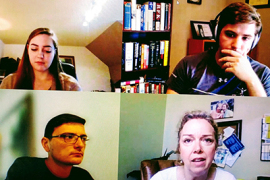Innovation in Education — How Liberty University Uses Learning Science to Prepare Students for the Future
From sending videotaped lessons through the mail in the 1980s, to taking advantage of high-speed internet to reach thousands across the globe today, Liberty University has used the latest technological advancements to help students meet their career goals.
As more institutions realize that online programs are significant to the future of academia, they are looking to Liberty as the standard-setter. And with its firm mission to Train Champions for Christ, the university has kept its focus on the student experience, providing quality education in a convenient and affordable format that utilizes the latest digital teaching tools.
“It is more than just being competitive,” explained Dr. Scott Hicks, interim provost. “It is about adding value for our students.”
Liberty’s tuition remains among the lowest for private institutions — about 30 percent below the national average. Tuition for all online undergraduate, graduate, and doctoral programs has not increased in three years, and this coming fall, Liberty is taking this commitment a step further. Because college students often indicate that the high cost of books causes them to purchase outdated versions or even to take fewer classes, digital books and instructional materials will be provided at no cost to all online students enrolled in undergraduate programs starting Fall 2018. (Textbooks that have no digital option will be provided to students in hard copies at no cost.)
>>>Request for Liberty University Online degree info now.
“Our priority is doing our best to operate in such a way that we can minimize costs for the student,” Hicks said. “With the high cost of education out there, the goal at Liberty is to keep costs down so that students can see that we are being good stewards of their time, energy, and effort — it’s their investment.”
Liberty aims to deliver a seamless user experience with all learning tools readily available and synced to the online student’s profile.
“When we look at building out technology, we want to do it with a certain amount of fluidity, utility, and scalability,” Hicks said. “The goal is to be able to meet a student anywhere in the world, on any device, at any time, teaching them in just the way they need it.”
The experience begins within Blackboard, a Learning Management System (LMS) where students log in to do their coursework, correspond with professors, and take tests. Blackboard has been in the business of online education for over 20 years and recognizes Liberty’s remarkable progress.
“Liberty has an amazing focus on creating the best and most unique student experience, whether on their physical campus or in their online programs,” said Phillip Miller, Blackboard vice president of teaching and learning. “The Liberty academic technology team moves with an agility that means they’re always changing. What’s fun about working with Liberty is seeing them combine those tools in unique ways with high-quality content and then scale the whole academic platform across their growing user base.”
>>>Request for Liberty University Online degree info now.
Liberty’s commitment to online student success is also evidenced by its implementing of new technologies that can identify areas where students are struggling and recommend action, such as displaying a prompt to review certain portions of text. Innovative partners — including McGraw-Hill Education and Cengage — are working with Liberty to create systems that can meet the unique learning needs of each student.
“These technologies are helping us explore the best ways to teach a subject, or a specific topic within a subject, so that the student will not only learn, but retain what they have learned,” Hicks said.
“It’s called ‘learning science,’” said Connie Allison, executive director of Liberty’s Center for Academic Development. “We’re integrating assignments, offering checks and balances, and, hopefully, helping students do better in true learning.”
Over the next six to 12 months, Liberty will incorporate this science into all of its more than 500 online undergraduate courses (120 courses already have these platforms). Eventually, all courses at all levels — on campus or online — will offer these types of cutting-edge technologies.
“As partners with Liberty University, we know firsthand how their leaders embrace innovation to support the best learning experience possible for their students,” said Michael Hansen, CEO of Cengage. “We applaud them for taking actions that will have a direct impact on affordability and access for their students.”
Scott Virkler, chief product officer for higher education at McGraw-Hill, said the company is pleased to strengthen its partnership with Liberty in providing digital solutions that are designed with the flexibility that today’s instructors need to meet a diverse student population.
“Liberty’s groundbreaking approach to digital learning is making college education more accessible, affordable, and valuable for students,” Virkler said. “Using data to better inform students along their educational journey and removing barriers to learning is a vision McGraw-Hill shares. We’re proud to partner with Liberty to make our adaptive technology, content, and platforms easy to access for all students.”
The university’s efforts to make an already successful online program even more beneficial for its students will ensure it stays ahead of the curve.
“No matter what your industry is, it doesn’t make sense to keep doing something because it is what you did 15 years ago,” Allison said. “You look at what the new tools are and ask, ‘How can we achieve our goals better?’ That is what this is about.”
With more than 550 unique programs of study from the certificate to the doctoral level, including over 280 offered online, Liberty University is Training Champions for Christ to impact every corner of society. In addition to the university’s regional accreditation by the Southern Association of Colleges and Schools Commission on Colleges, many programs are accredited or otherwise recognized by specialized professional and accrediting agencies.
>>>Request for Liberty University Online degree info now.





